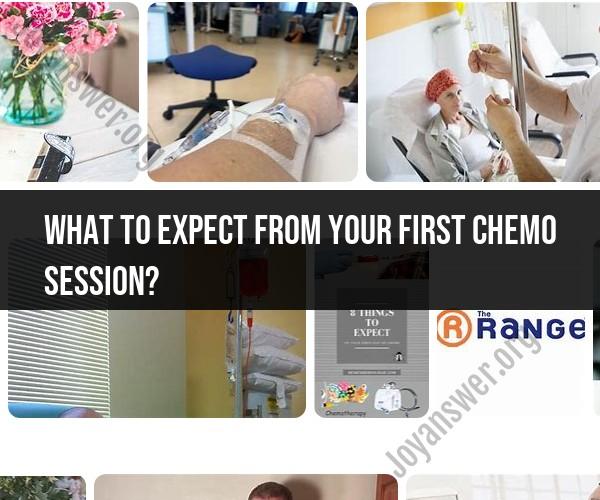What to expect from your first chemo session?
Undergoing your first chemotherapy (chemo) session can be a daunting experience, but knowing what to expect can help you prepare both physically and emotionally. Here are some things to keep in mind:
Preparation:
- Your healthcare team will provide instructions on how to prepare for your chemo session. This may include fasting or dietary restrictions before the treatment.
- Wear comfortable and layered clothing, as the treatment room can be cold.
Arrival:
- Arrive at the cancer center or hospital with plenty of time to spare. The first session may involve additional paperwork, discussions with your medical team, and health assessments.
Medical History and Consent:
- Your medical team will review your medical history, including allergies, medications, and any changes in your health since your last visit.
- You will be asked to provide informed consent, indicating that you understand the treatment and potential risks.
IV Placement:
- Most chemotherapy is administered intravenously (IV). A nurse or healthcare provider will insert an IV line, usually in your arm, to deliver the medications.
Medications:
- The chemotherapy drugs will be mixed and delivered through the IV. This process can take several hours.
- You may receive multiple drugs, either on the same day or over several days, depending on your treatment plan.
Monitoring:
- While receiving chemo, you will be closely monitored by healthcare professionals. They will check your vital signs, watch for any adverse reactions, and address any discomfort or side effects promptly.
Side Effects:
- You may experience side effects during or after the treatment. These can include nausea, fatigue, hair loss, changes in appetite, and more.
- Your medical team will provide medications and strategies to manage these side effects. Let them know if you are experiencing any discomfort.
Duration:
- The length of your chemo session will vary depending on the drugs and treatment plan. Some sessions can take a few hours, while others may take most of the day.
Support:
- You don't have to go through this alone. Many cancer centers offer support services, including counseling, support groups, and social workers who can help you navigate the emotional and practical aspects of your treatment.
Follow-Up:
- After your first chemo session, your medical team will discuss your treatment schedule and any follow-up appointments.
- Be prepared to return for additional sessions as recommended by your healthcare provider.
Emotional Support:
- It's normal to have mixed emotions about chemotherapy. Reach out to friends, family, or a therapist for emotional support during your treatment journey.
Plan Ahead:
- Plan for transportation to and from your treatment sessions, as you may not feel well enough to drive after chemo.
- Arrange for childcare or pet care if needed.
Remember that everyone's experience with chemotherapy is unique. While some people may experience significant side effects, others may have a milder reaction. Open communication with your healthcare team is essential to managing your treatment and addressing any concerns or questions you may have. They are there to support you throughout your cancer journey.
Your First Chemotherapy Session: What to Anticipate and Prepare For
Your first chemotherapy session can be a daunting experience, but it is important to remember that you are not alone. Your healthcare team will be there to support you throughout the process and help you to manage any side effects that you experience.
Here is what to anticipate and prepare for during your first chemotherapy session:
- Arrival: When you arrive at the clinic or hospital, you will be greeted by a nurse or other member of your healthcare team. They will review your medical history and medications, and they will answer any questions that you have.
- IV placement: An IV (intravenous) line will be inserted into your arm. This is how the chemotherapy drugs will be administered.
- Premedication: You may be given premedication medications to help prevent nausea, vomiting, and other side effects.
- Chemotherapy administration: The chemotherapy drugs will be administered through your IV line. The administration process can take a few minutes to several hours, depending on the type of chemotherapy drugs you are receiving.
- Monitoring: During the chemotherapy administration, your nurse will monitor your vital signs and condition. They will also be available to answer any questions or concerns that you have.
- Post-chemotherapy care: After the chemotherapy administration, you will be monitored for a period of time before being discharged. Your nurse will also provide you with instructions on how to manage any side effects that you may experience at home.
Navigating the Emotional and Physical Aspects of Your Initial Chemo Treatment
It is normal to feel a range of emotions, such as anxiety, fear, and uncertainty, before and during your first chemotherapy session. It is important to talk to your healthcare team about your feelings and concerns. They can offer you support and guidance as you navigate this challenging time.
The physical effects of chemotherapy can vary depending on the type of drugs you are receiving. Some common side effects include:
- Fatigue
- Nausea and vomiting
- Hair loss
- Loss of appetite
- Mouth sores
- Diarrhea
- Constipation
- Anemia
- Increased risk of infection
Your healthcare team can provide you with medications and other strategies to help manage these side effects.
Tips for Coping with Side Effects During Your First Chemo Session
Here are some tips for coping with side effects during your first chemotherapy session:
- Dress comfortably: Wear loose-fitting, comfortable clothing to your chemotherapy session. This will make it easier for the nurse to insert the IV line and to administer the chemotherapy drugs.
- Bring a support person: It may be helpful to bring a friend or family member to your chemotherapy session. They can provide emotional support and help you to manage any side effects that you experience.
- Ask about premedication: Ask your healthcare team about premedication medications that can help to prevent nausea, vomiting, and other side effects.
- Stay hydrated: It is important to stay hydrated during and after your chemotherapy session. Drink plenty of fluids, such as water, clear broths, and juices.
- Eat small, frequent meals: Eating small, frequent meals can help to reduce nausea and vomiting. Avoid foods that are greasy, spicy, or acidic.
- Manage constipation: Constipation is a common side effect of chemotherapy. To manage constipation, eat a diet that is high in fiber and drink plenty of fluids. You may also need to take a laxative.
- Take care of your skin: Chemotherapy can make your skin dry and sensitive. To protect your skin, use a mild soap and moisturizer. Avoid sun exposure and wear sunscreen when you are outdoors.
- Get plenty of rest: Fatigue is a common side effect of chemotherapy. It is important to get plenty of rest to help your body to recover.
If you experience any side effects during your first chemotherapy session, be sure to tell your nurse. They can provide you with medications and other strategies to help manage your symptoms.












